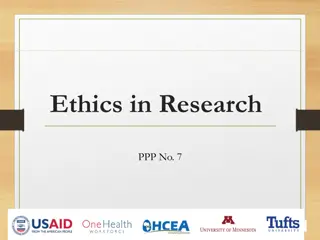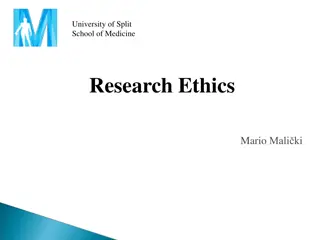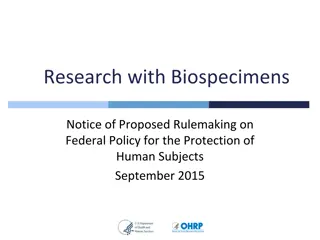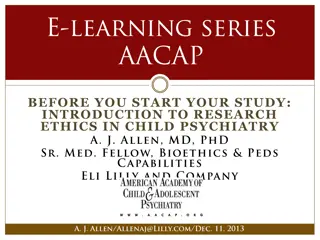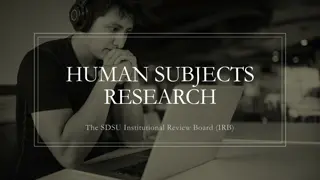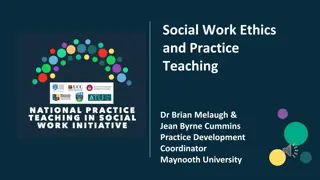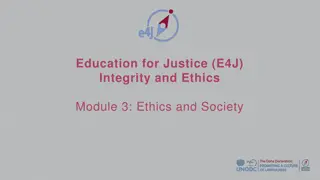Ethics in Social Work Research: Understanding Human Subjects and Principles
Research on humans presents ethical complexities, requiring adherence to fundamental principles outlined in the Belmont Report: Respect for Persons, Beneficence, and Justice. This chapter explores ethical considerations at various levels and emphasizes the importance of ethical conduct in social work research. Additionally, it discusses the distinction between the practice and application of science. The text also touches on voter fraud data analysis and the significance of reliable research in informing policy decisions.
Download Presentation

Please find below an Image/Link to download the presentation.
The content on the website is provided AS IS for your information and personal use only. It may not be sold, licensed, or shared on other websites without obtaining consent from the author. Download presentation by click this link. If you encounter any issues during the download, it is possible that the publisher has removed the file from their server.
E N D
Presentation Transcript
Chapter 5: Ethics in Social Work Research Scientific Inquiry in Social Work
Chapter Overview Research on humans is complicated. There are specific ethical issues to consider. Research has not always been regulated like it is today This chapter will look at ethics at micro, meso, and macro levels. We ll also discuss how the practice of science is different than the uses of science.
The Belmont Report explains the three fundamental ethical principles for conducting research with human subjects. 1. Respect for persons: protecting the autonomy of all people and treating them with courtesy and respect and allowing for informed consent. Researchers must be truthful and conduct no deception; Belmont Report 2. Beneficence: the philosophy of "Do no harm" while maximizing benefits for the research project and minimizing risks to the research subjects; and 3. Justice: ensuring reasonable, non-exploitative, and well-considered procedures are administered fairly the fair distribution of costs and benefits to potential research participants and equally. These principles from the Belmont Report are a primary basis for institutional review boards (IRBs) on human subjects research.
https://www.youtube.com/watch?v=nSVL 6FA5SdU Is the CNN report right about voter fraud?
More on data regarding voter fraud In spite of substantial public controversy, very little reliable data exists concerning the frequency with which non-citizen immigrants participate in United States elections. Although such participation is a violation of election laws in most parts of the United States, enforcement depends principally on disclosure of citizenship status at the time of voter registration. This study examines participation rates by non-citizens using a nationally representative sample that includes non-citizen immigrants. We find that some non-citizens participate in U.S. elections, and that this participation has been large enough to change meaningful election outcomes including Electoral College votes, and Congressional elections. Non-citizen votes likely gave Senate Democrats the pivotal 60th vote needed to overcome filibusters in order to pass health care reform and other Obama administration priorities in the 111th Congress. Source: Richman, J. T., Chattha, G. A., & Earnest, D. C. (2014). Do non-citizens vote in US elections?. Electoral Studies, 36, 149-157.
Ansolabehere, S., Luks, S., & Schaffner, B. F. (2015). The perils of cherry picking low frequency events in large sample surveys. Electoral Studies, 40, 409-410. The advent of large sample surveys, such as the Cooperative Congressional Election Study (CCES), has opened the possibility of measuring very low frequency events, characteristics, and behaviors in the population. This paper documents how low-level measurement error for survey questions generally agreed to be highly reliable can lead to large prediction errors in large sample surveys, such as the CCES. Richman et al. (2014) presents a biased estimate of the rate at which non-citizens voted in recent elections. The results, we show, are completely accounted for by very low frequency measurement error; further, the likely percent of non-citizen voters in recent US elections is 0. The Perils of Cherry Picking
Check Yourself: Ethical Considerations with Human Subjects Check Yourself: Ethical Considerations with Human Subjects Table 5.1: Key ethics questions at three different levels of inquiry Level of Inquiry Focus Key ethics questions for researchers to ask themselves Micro-level Individual Does my research impinge on the individual s right to privacy? Could my research offend subjects in any way? Could my research cause emotional stress to any of my subjects? Has my own conduct been ethical throughout the research process? Meso-level Group Does my research follow the ethical guidelines of my profession and discipline? Could my research negatively impact a community? Have I met my duty to those who funded my research? Macro-level Society Does my research meet the societal expectations of social research? Have I met my social responsibilities as a researcher?
In 1998, hundreds of research studies at VCU were shut down because of a father who complained he did not consent to his daughter completing a question about his entire family s medical history. He was concerned that his private medical information becoming public may result in him losing his security clearance and job He complained that the consent form did not adequately explain the risks of participating in the study The researcher s glib and condescending responses to him resulted in the shutdown of VCU s IRB for a time and the halting of all academic research at the school VCU s IRB Troubles
Human Subjects Research Human subjects research involves a living individual about whom the researcher obtains data through intervention, interaction, or identifiable private information Nonhuman research subjects: historical documents, media, animals, viruses Can you see how you might study your topic by using human subjects? How about nonhuman subjects?
https://www.youtube.com/watch?v= DsWJPNhLCUU The Stanford Prison Experiment
Voluntary participation Informed consent Legal rights Risks/benefits Purpose Data collection, analysis, and storage Anonymity vs. confidentiality Deception Conflicts of interest Honesty in reporting Vulnerable populations How did these apply in the Stanford Prison experiment? Key Terms in Ethical Consideration for Research What could have been done differently to make it an ethical study?
Exempt: involves minimal human subject involvement (existing data) Institutional Review Boards (IRB) Exempt All institutions that receive federal support for research must have an IRB that oversees research studies. Expedited: present minimal risk of harm (existing records, survey or interview, observation) Expedited There are three levels of research review: Full: present risk of harm to subjects, include vulnerable population (prisoners, children, etc.) Full


